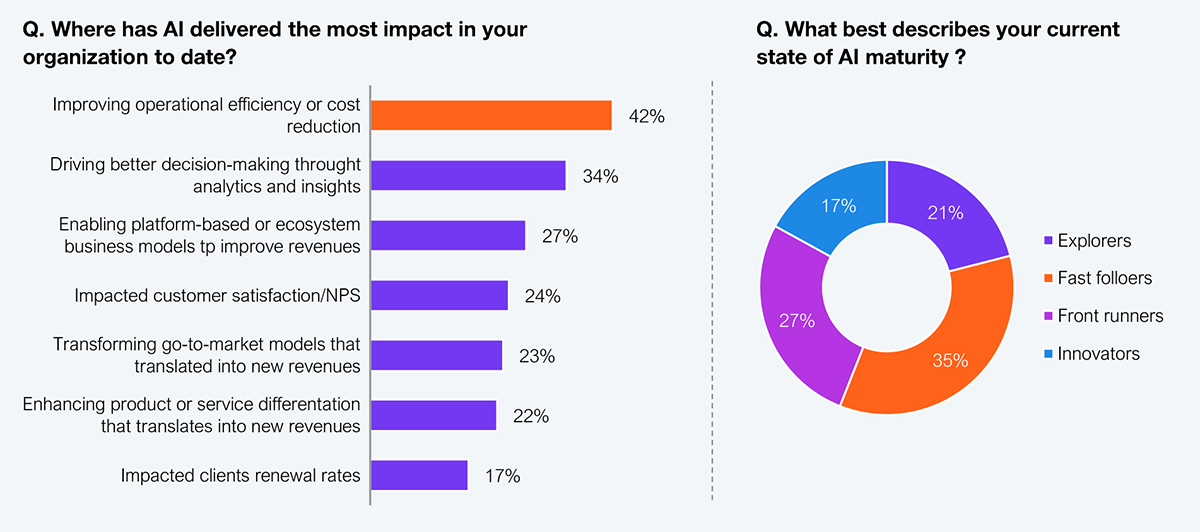CIOs and COOs can no longer treat AI as a cost lever or a tool experiment. Client consumption models are shifting too fast, and many of the old operating model assumptions are collapsing. AI is rewriting the rules for every ecosystem player, including customers, service providers, and software firms. HFS witnessed this firsthand at HCLTech’s Analyst Day in Australia, where the company demonstrated its transformation from a diverse portfolio offering of chips, cloud, infrastructure, and engineering into a unified Services-as-Software™ model designed to deliver end-to-end business outcomes.
For enterprise leaders, the strategic imperative is clearly about rebuilding the business model around AI as a competitive advantage, not an optimization exercise.
AI is moving fast, but that’s not why enterprises are failing at it. They’re failing because they’re still treating AI as a tool rollout, not a business-model redesign.
The newer manifestations of AI, such as agentic systems, expose this gap more sharply. The basic fixes for enabling GenAI aren’t enough to transition to agentic models or even to scale beyond narrow, use-case-level outcomes. Pivoting to the next wave of AI disruption and scaling meaningfully require a level of architectural, data, and operating-model readiness that most enterprises simply don’t have yet.
Instead of building this foundation, many CIOs and COOs are still chasing AI out of FOMO, buying tools faster than they’re building capability. This tool-first mindset can’t either scale or differentiate. It locks enterprises into fragmented pilots, siloed AI teams, and workflows that were never designed for autonomy, reasoning, or orchestration.
HCLTech’s approach stood out as the company wasn’t talking about tools. It showcased a blueprint for AI readiness built on strengthened data, cloud, and governance foundations; redesigned operating models and talent structures; and a clear distinction between where automation delivers efficiency and where autonomy creates real enterprise value.
Enterprises still treating AI as a productivity and cost-reduction exercise are locking themselves into diminishing returns. Productivity and efficiency gains are being commoditized fast, leaving everyone chasing the same savings and efficiencies instead of redefining the game. The front-runners in AI are breaking away (see Exhibit 1). They may not all be innovators yet, but they’ve moved beyond passive observation, using AI to accelerate product innovation, fuel revenue growth, and create market speed.
This is the real decision point for CIOs and COOs: whether to automate existing processes or rewire them for new sources of value. Higher value will come only when operating models are redesigned for AI, not when AI is layered on top of legacy workflows.

Sample: 504 Global 2000 firms, 2025
Source: HFS Research, 2025
This readiness gap is where HCLTech steps in with its engineering-led AI arsenal assets, forged through real-world deployments. Frameworks such as AI.Force, AI Foundry, and AI Factory provide plug-and-play accelerators that are tested, verticalized (especially for BFS), and governed from the ground up. These assets are engineered to launch AI at speed and scale, giving enterprises a proven foundation to secure efficiency gains and then pivot quickly toward differentiation.
HCLTech’s partnerships with major tech players give it scale, but the pace of AI innovation now demands broader ecosystem reach, including emerging and niche partners across the “chips-to-apps” stack, to drive agility and speed. As AI reshapes the enterprise landscape, operations are rewired too. The future isn’t traditional BPO with bodies on seats; it’s a next-gen operating model that fuses digital, tech, and operational capabilities to deliver seamless experiences across customers and employees while driving measurable business impact. HCLTech is leading this shift, tying customer experience transformation to reengineered operations with employees firmly in the loop.
Service providers are evolving, and vendors are reinventing themselves. But real transformation starts with enterprise leaders putting the fundamentals in place for AI-era disruption. Those like HCLTech are proving that AI can reimagine business and unlock new value, but it’s the enterprise that must lead the charge. The time to create readiness for what’s next is now, before the next wave hits.
Register now for immediate access of HFS' research, data and forward looking trends.
Get StartedIf you don't have an account, Register here |
Register now for immediate access of HFS' research, data and forward looking trends.
Get Started